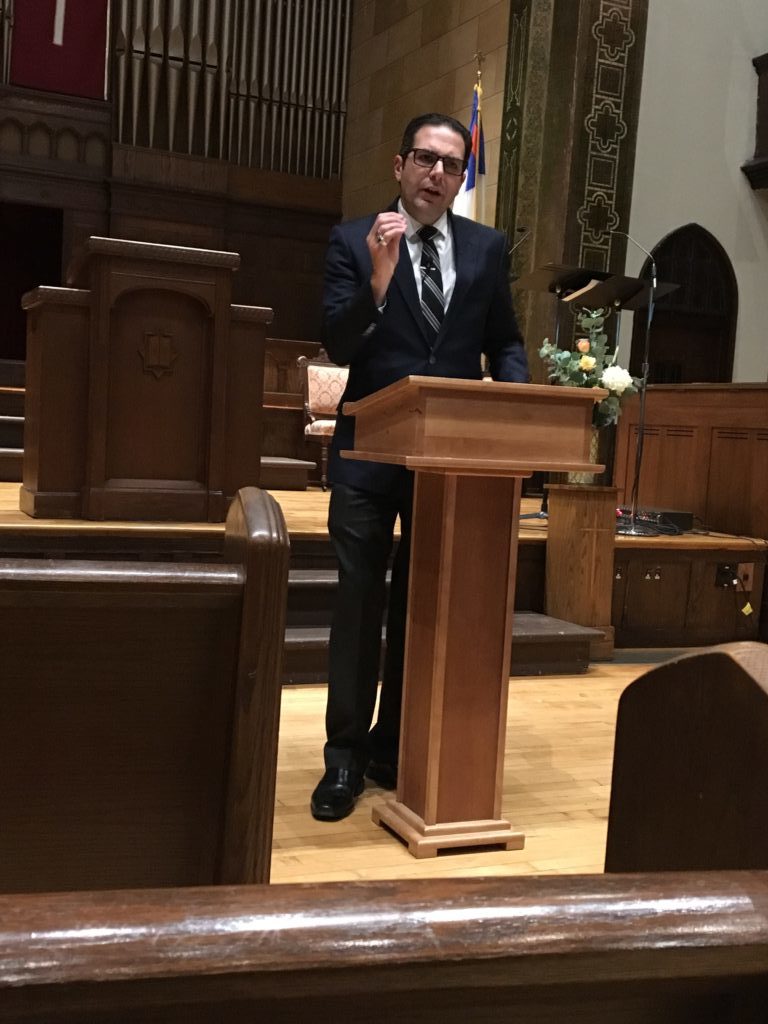
For Pastor Chris Castaldo — a former Roman Catholic — constructive engagement and sympathetic discourse across Reformation lines has been a longtime endeavor.
Castaldo, who hails from New Covenant Church in Naperville, Illinois, opened his Feb. 21 lecture at College Baptist Church by inquiring how many in the audience came from a Roman Catholic background. After a handful of the 40 or so attendees raised their hands, Castaldo asked how many attendees allow for the possibility that Catholics can be genuinely Christian, and how many recognize the institution of the Catholic Church as genuinely Christian.
Castaldo said in the past he has has received conflicting responses among Protestant audiences to these last two questions. He himself maintains that while some Catholics are genuine Christians and others are not — as is also the case, he said, among Protestants — the Catholic Church as an institution does indeed belong to the Christian tradition and possesses the resources to speak biblically, even if he may disagree with some of its doctrines.
Castaldo emphasized the importance of handling discussions between Protestants and Catholics with “grace and truth.” According to Castaldo, Protestants need to find a balance between maintaining firmness in their beliefs and expressing those beliefs in a gracious way.
“Protestants are either foaming-at-the-mouth pitbulls who go for the jugular with their dear Catholic friends with whom they disagree, or, on the other extreme, they can be so open-minded that their doctrinal brains fall out of their heads,” he said.
Castaldo explained that the chief distinction between the Roman Catholic faith and that of evangelical Protestants is the issue of authority: while Catholics see faith primarily through an institutional lens, Protestants see it through a Bible-centered lens.
Catholics and Protestants, for example, see the reality of denominational differences in different lights, Castaldo said. While Catholics criticize Protestants for what they see as a problematic lack of unity among their churches, Protestants do not view denominational dispersion as a concern, since they do not depend on institutional authority in the same way that Catholics do.
Castaldo emphasized that in every discussion, Protestants should aim to help the other person “take a tangible step closer to Jesus” and try to find where they share commonality in their Christian identity.
“Your approach to this person is to be a good friend, to love them, to put relational currency in the bank, so that when that person goes through suffering — and we all do — then they will turn to you and give you the privilege of walking beside them and sharing the good news,” he said.
Ben Cuthbert, pastor of College Baptist Church, said Castaldo’s lecture has been a year in the making. The church’s leaders, he said, wanted to learn how to “engage Catholics and Protestants in the Hillsdale community in charitable discussion while maintaining conviction.”
Cuthbert said in his 18 months at Hillsdale, he has seen a prevalence of conversions between traditions — “more than I’ve ever seen” — and felt it was a topic the church should address.
Sophomore Caroline Hennekes, who grew up Roman Catholic but is now Protestant, said Castaldo’s lecture was helpful, as she often engages in similar discussions about faith traditions with her Catholic family members.
“He had a good quote about how our conversations need to come from grace and truth and how you can’t have only one or the other. They work simultaneously, and I think that fuels conversation,” she said. “I have almost a right to defend the truth and defend the word, but I do that in a language sprinkled with grace because that’s how God gives truth to us as well.”
College Chaplain Adam Rick, who also serves as rector at Holy Trinity Parish, noted that Hillsdale’s campus is “uniquely ecumenical.”
“There can be friction in areas where we disagree, but genuine friendships formed across the ecclesial divide also deepen the spirituality of all concerned by exposing them to the strengths of traditions other than their own,” he said in an email. “This can only deepen both our appreciation for the whole of Christ’s body on earth and also our prayers for the unity of the same.”
Senior and Catholic Sammy Roberts attended a similar discussion between Castaldo and Professor of History Matthew Gaetano earlier in the day. Roberts said while discussing historical figures in the justification controversy can be helpful, it also has its drawbacks.
“I walked away from the talk with a better academic understanding, but the historical approach didn’t really do anything to further dialogue between the living communities of the present,” Roberts said in an email. “That kind of discourse will be harder and more difficult than an intellectual correspondence, but its fruits may be more beneficial in the long run.”
Rick also noted that some attendees found the discussion to be “unhelpfully subtle.” However, he says it’s important to pay attention to the details.
“For my part, I have grown deeply in my understanding of the Roman and Reformation traditions by learning of these doctrinal nuances,” he said. “It’s helped me make sense of a lot of the surface differences we might be tempted to dismiss as unimportant.”

